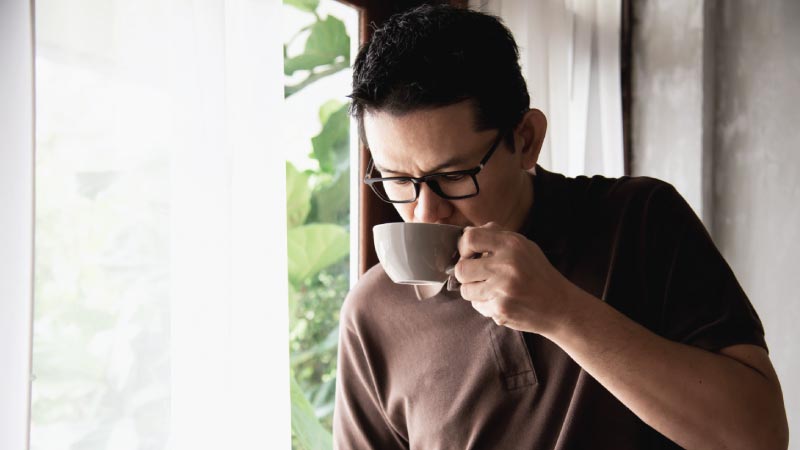Why Do You Only Poop After Drinking Coffee Or Tea?
4 months ago

Ever feel like your digestive system just won’t get going until you’ve had your morning cup of coffee or tea? You’re not alone! For many people, that first sip seems to activate their body’s internal plumbing, almost like clockwork. Is it the caffeine? The warmth? Or just a psychological trick?
Let’s dive into the science behind this strange yet common phenomenon and uncover why your bathroom schedule might be tied to your favorite morning beverage.
1. The "Wake-Up Call" for Your Gut
Mornings can be rough. You drag yourself out of bed, make your way to the kitchen, and reach for that comforting cup of coffee or tea. Within minutes of taking a few sips, you suddenly feel the need to visit the restroom. But why does your gut only seem to work after that morning drink?
Your digestive system doesn’t work on a strict timer—it responds to stimuli. And guess what? Coffee and tea are some of the strongest natural stimulants for your gut.
Also Read: Foods That Improve Digestion and Gut Health
2. The Caffeine Effect: More Than Just an Energy Booster
Caffeine is well known for its ability to wake up your brain, but it also plays a major role in waking up your intestines. It stimulates the nervous system, which can increase muscle contractions in your digestive tract—a process known as colonic motility.
Think of your intestines like a conveyor belt that moves food waste along. Caffeine essentially speeds up this process, encouraging your colon to push things out faster. That’s why even decaffeinated coffee can have a similar effect—other compounds in coffee also stimulate digestion.
Try: Low-Caffeine Drinks If You Want To Quit Coffee
3. The Gastrocolic Reflex: Your Stomach’s Alarm System
Drinking any liquid, especially warm beverages like coffee or tea, triggers a gastrocolic reflex—a natural response where your stomach tells your colon, "Hey, more food is coming! Make some space!"
This reflex is part of your body's natural rhythm to make digestion efficient. When you drink coffee or tea, your stomach expands slightly, which sends signals to your colon to start contracting. The result? You feel the need to go.
Interestingly, this reflex is strongest in the morning, which is why coffee or tea seems to have a stronger effect at that time of day.
Also Read: Warning Signs Of Serious Gastric Problems You Shouldn't Ignore
4. The Role of Acidity in Coffee and Tea
Coffee, in particular, is highly acidic, and this acidity plays a role in digestion. When you drink coffee, it stimulates your stomach to produce more gastric acid, which helps break down food faster.
Tea, especially black tea, contains tannins, which can also mildly irritate the stomach lining and encourage bowel movements. However, the effect of tea is usually milder compared to coffee.
5. Hormonal Influence: The "Poop Hormones"
Did you know your body releases certain hormones that encourage digestion? Coffee increases the production of two important hormones:
- Gastrin – This hormone tells your stomach to produce more acid and speeds up movement in your intestines.
- Cholecystokinin (CCK) – This hormone helps with digestion by triggering the release of bile and enzymes. It also plays a role in signaling your intestines to empty out.
Both of these hormones contribute to that sudden urge to use the restroom after drinking coffee.
6. The Psychological Factor: Habit and Conditioning
Ever noticed that your body follows a routine? If you drink coffee or tea every morning and then use the restroom, your body eventually learns this pattern. Over time, even the smell or taste of coffee can signal your digestive system to get ready.
It’s like a Pavlovian response—your body expects the drink to trigger a bathroom trip, so it prepares for it even before caffeine fully kicks in. This is why some people who switch to decaf still experience the same effect.
7. Hydration: The Underrated Factor
One simple reason why coffee and tea might help you poop is hydration. Both beverages contain water, and staying hydrated is essential for keeping your digestive system running smoothly.
Warm liquids, in particular, help relax and stimulate the intestines. That’s why even a simple glass of warm water in the morning can have a similar effect.
Why Some People Are More Sensitive Than Others?
Not everyone experiences a strong urge to poop after drinking coffee or tea. Here’s why:
- Sensitivity to caffeine – Some people react strongly to caffeine, while others barely notice its effects.
- Digestive health – If you have a slower digestive system, coffee might be the nudge it needs to get going.
- Diet and lifestyle – If you eat a fiber-rich diet and stay hydrated, you might not need coffee as a digestive aid.
How to Poop Without Coffee or Tea?
If you rely too much on coffee or tea to kickstart your digestion, you might want to explore other ways to stay regular:
- Drink warm water in the morning – This mimics the effects of coffee by stimulating digestion.
- Increase fiber intake – Eat more fruits, vegetables, and whole grains.
- Move your body – Exercise, even a short walk, can help stimulate digestion.
- Manage stress – Anxiety and stress can slow down digestion.
- Stay hydrated – Dehydration can lead to constipation.
Final Thoughts: Should You Be Concerned?
If your morning coffee or tea is the only thing helping you poop, it’s not necessarily a bad thing! However, if you find yourself completely reliant on caffeine to stay regular, it might be a sign that your digestive health needs some attention.
Try incorporating fiber-rich foods, drinking more water, and staying active to keep things moving naturally. But if coffee or tea works for you—why mess with a good thing? Just enjoy your morning ritual and let nature take its course!